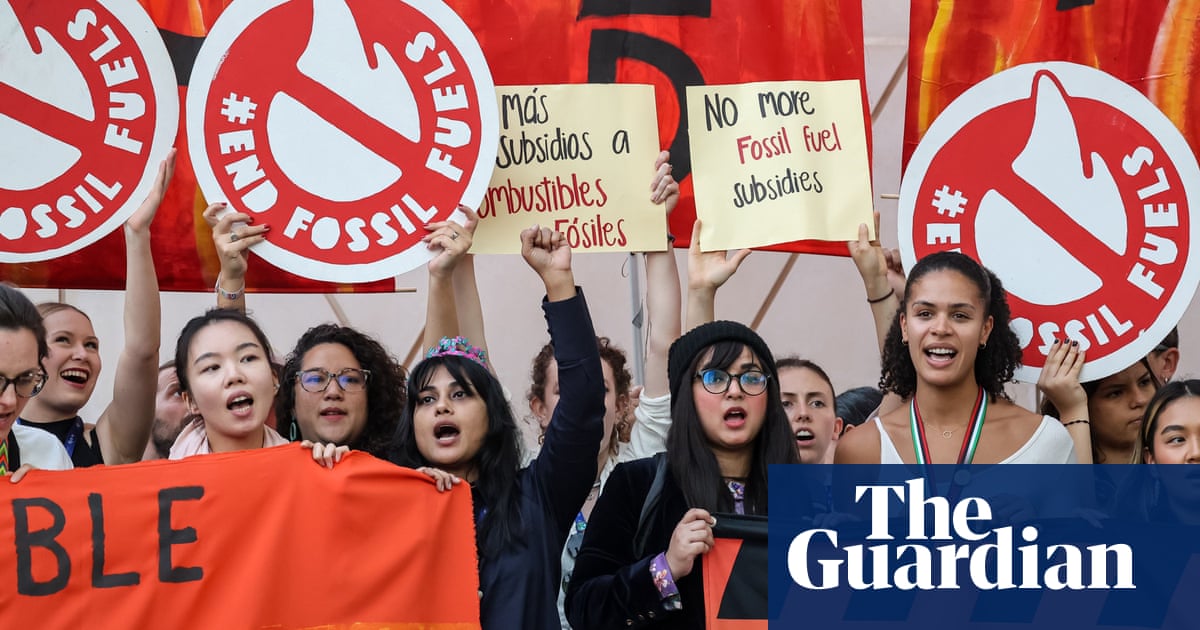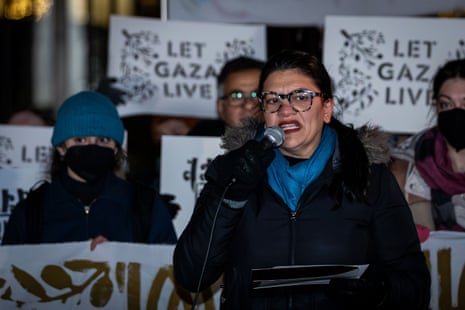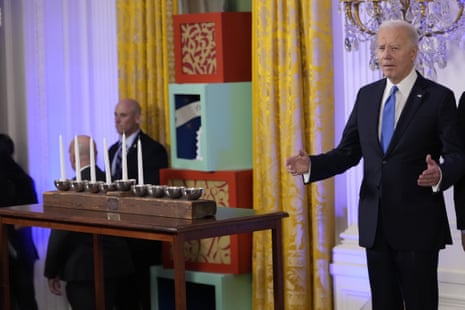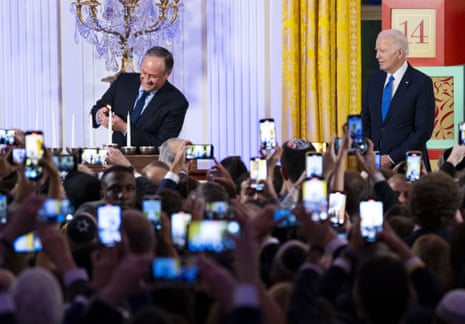
A new draft climate agreement released at the Cop28 climate summit in the United Arab Emirates has for the first time explicitly called on nations to transition away from fossil fuels to avert the worst impacts of the climate crisis.
But the latest proposed text, released by the Cop president, Sultan Al Jaber, early on Wednesday, did not include an explicit commitment to phase out or phase down fossil fuels, as many countries, civil society groups and scientists have urged.
Instead, it called on countries to contribute to global efforts to transitioning away from fossil fuels in energy systems “in a just, orderly and equitable manner, accelerating action in this critical decade, so as to achieve net zero by 2050 in keeping with the science”.
The release of the proposed compromise followed a fraught 36 hours of negotiations after Al Jaber released a draft which was roundly rejected by rich and poor countries, who described it as “grossly insufficient”, “incoherent” and a “death certificate” for low-lying and vulnerable nations.
The new proposal said countries recognised “the need for deep, rapid and sustained reductions in greenhouse gas emissions in line with 1.5C pathways”, and called for a tripling of global renewable energy capacity by 2030. It repeated language agreed at previous summits calling on nations to accelerate efforts “towards the phase-down of unabated coal power”.
It also called for the development of a list of “zero- and low-emission technologies” including “renewables, nuclear, abatement and removal technologies such as carbon capture and utilisation and storage, particularly in hard-to-abate sectors, and low-carbon hydrogen production”.
The draft is meant to reflect the consensus view of nearly 200 countries gathered at the conference in Dubai, where scores of governments have insisted on strong language to signal an eventual end to the fossil fuel era against protests from Saudi Arabia and members of the oil producing group OPEC.
Country representatives have been called to what the Cop28 presidency hopes is a final meeting later Wednesday morning, where they could pass the deal and end two weeks of tough negotiations that have run a day into overtime.
Norway’s minister for climate and the environment, Espen Barth Eide, was among the first to react, saying the new draft was the first time that the world had united around “such a clear text on the need to transition away from fossil fuels”.
“It has been the elephant in the room, at last we address it head on,” he said.
The Alliance of Small Island States (Aosis), a bloc of 39 countries, said the second draft was an improvement and reflected a number of their submissions, but still contained “a litany of loopholes”.
“Our world’s window to keeping 1.5 alive is rapidly closing, and we feel the text does not provide the necessary balance to strengthen global action for course correction on climate change,” it said in a statement.
“Aosis has been very clear that the global stocktake must be the vehicle for delivery of course correction, yet it sputters in significant areas … We must note the text does not speak specifically to fossil fuel phaseout and mitigation in a way that is in fact the step change that is needed. It is incremental and not transformational.”
Mohamed Adow, from Power Shift Africa, said it was the “first time in three decades of climate negotiations the words fossil fuels have ever made it into a Cop outcome”.
“The genie is never going back into the bottle and future Cops will only turn the screws even more on dirty energy,” he said.
But while this sent a strong signal, he said there were still too many loopholes “on unproven and expensive technologies like carbon capture and storage, which fossil fuel interests will try and use to keep dirty energy on life support”. Adow said the text was missing the climate finance need to help developing countries decarbonise, and there needed to be a greater expectation that rich fossil fuel producers acted first.
“Some people may have had their expectations for this meeting raised too high, but this result would have been unheard of two years ago, especially at a Cop meeting in a petrostate. It shows that even oil and gas producers can see we’re heading for a fossil free world,” he said.
Rachel Cleetus, from the Union of Concerned Scientists, said the text sent a strong signal that world leaders recognised the need for a sharp turn away from fossil fuels towards clean energy in this decade, aligned with scientific warnings.
“The finance and equity provisions, however, are seriously insufficient and must be improved in the time ahead in order to ensure low- and middle-income countries can transition to clean energy and close the energy poverty gap,” she said.
Deals struck at UN climate summits must be passed by consensus, at which point individual countries are responsible for delivering on the agreements through national policies and investments.
Al Jaber, president of the talks on behalf of the United Arab Emirates, had earlier engaged in an intense round of shuttle diplomacy throughout Tuesday and had meetings with heads of delegation singly and in groups planned until 3am on Wednesday.
Climate justice advocates have told the Guardian that rich countries have failed to show the leadership necessary to solve the climate crisis, and many are too mired in their own hypocrisy over fossil fuels to break the impasse at Cop28,
Saudi Arabia and a few allied countries were in a small minority that had publicly raised strong objections to the inclusion of any reference to reducing the production and consumption of fossil fuels in the text of a potential deal.
Many developed countries have publicly pushed hard for a phase-out of coal, oil and gas – but with caveats such as “unabated” or just coal, in the case of the US.
In contrast, many in the developing world – despite their desire to see global temperatures limited to 1.5C above pre-industrial levels – say any commitment to phasing out fossil fuels must be “fair, funded, and fast”, with the rich polluting countries transitioning first.
https://news.google.com/rss/articles/CBMiigFodHRwczovL3d3dy50aGVndWFyZGlhbi5jb20vZW52aXJvbm1lbnQvMjAyMy9kZWMvMTMvY29wMjgtc2Vjb25kLWRyYWZ0LXRleHQtb2YtY2xpbWF0ZS1kZWFsLWNhbGxzLWZvci10cmFuc2l0aW9uaW5nLWF3YXktZnJvbS1mb3NzaWwtZnVlbHPSAYoBaHR0cHM6Ly9hbXAudGhlZ3VhcmRpYW4uY29tL2Vudmlyb25tZW50LzIwMjMvZGVjLzEzL2NvcDI4LXNlY29uZC1kcmFmdC10ZXh0LW9mLWNsaW1hdGUtZGVhbC1jYWxscy1mb3ItdHJhbnNpdGlvbmluZy1hd2F5LWZyb20tZm9zc2lsLWZ1ZWxz?oc=5
2023-12-13 04:06:00Z
CBMiigFodHRwczovL3d3dy50aGVndWFyZGlhbi5jb20vZW52aXJvbm1lbnQvMjAyMy9kZWMvMTMvY29wMjgtc2Vjb25kLWRyYWZ0LXRleHQtb2YtY2xpbWF0ZS1kZWFsLWNhbGxzLWZvci10cmFuc2l0aW9uaW5nLWF3YXktZnJvbS1mb3NzaWwtZnVlbHPSAYoBaHR0cHM6Ly9hbXAudGhlZ3VhcmRpYW4uY29tL2Vudmlyb25tZW50LzIwMjMvZGVjLzEzL2NvcDI4LXNlY29uZC1kcmFmdC10ZXh0LW9mLWNsaW1hdGUtZGVhbC1jYWxscy1mb3ItdHJhbnNpdGlvbmluZy1hd2F5LWZyb20tZm9zc2lsLWZ1ZWxz












